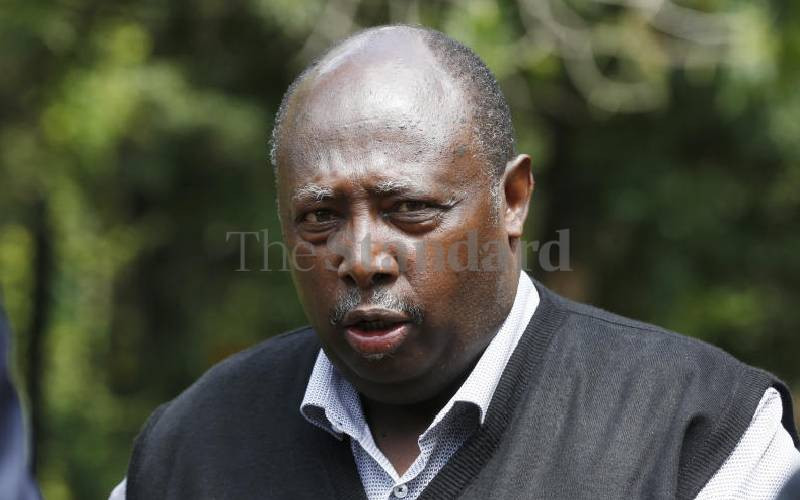Unmasking Injustice: Mbobu's Brutal Killing & Friend's Horrifying '96 Hours in Hell' Ordeal

The brutal murder of senior advocate Kyalo Mbobu has sent shockwaves through the Law Society of Kenya (LSK) and sparked a critical national conversation about extralegal killings and the rule of law. In a related development, city businessman George Wainaina, who had been accused in connection with Mbobu's murder, was officially cleared of suspicion. Speaking from his hospital bed, Wainaina described the accusations as the most traumatic experience of his life.
Mbobu, a distinguished legal practitioner, arbitrator, adjudicator, and law lecturer, was a prominent figure whose death has raised many questions. Following his murder, High Court judgments surfaced, revealing that a client had successfully sued Mbobu to recover Sh97 million held after a land transaction. Subsequent media reports further alleged that Mbobu's life was plagued by significant debts. These revelations have unfortunately led to diverse public opinions, with some lamenting the killing while others, dangerously, have implied that his financial troubles might offer a justification for his death.
Such a mindset, which suggests that extralegal killings can be permissible under certain circumstances, is not only unfortunate but profoundly perilous. It actively legitimizes actions that violate the law and paves the way for a breakdown of societal order. Kenya's robust Constitution unequivocally protects the right to life, with exceptions limited to judicially-sanctioned capital punishment. Despite this constitutional safeguard, extralegal killings remain a persistent issue. Chilling reminders of this reality include the recent murder of a former MP for Kabondo Kasipul under similar circumstances and the alarming number of civilian deaths at the hands of the police. Official records from the June 25, 2024 protests indicate that approximately 61 young people were killed by police officers, with more deaths reported during this year’s June 25 memorial protests.
The pervasive issue of unresolved cases of extralegal killings, coupled with the active involvement of police or state actors, contributes to the radicalization of criminal behavior. This breakdown in the justice system is mirrored in the troubling rise of femicide cases. There are subtle and overt suggestions that extralegal actions, whether perpetrated by law enforcement or civilians, are acceptable in certain situations. This dehumanizing perspective must be rejected, as human life is sacrosanct, and no individual, regardless of their perceived transgressions, deserves to die outside the bounds of natural causes or due process.
Victims of extralegal actions are not mere statistics; they are individuals with families and communities, whose loss is immeasurable. It is imperative that Kenya urgently addresses its cognitive dissonance regarding the rule of law. All discourse surrounding these murders must be firmly rooted in the Constitution and the Penal Code. Police investigations into the death of Mr. Mbobu and all other extralegal killings must be conducted with thoroughness and transparency. Furthermore, criminal justice actors are called upon to collaborate effectively to uphold the Constitution through the swift and impartial delivery of justice. Every unresolved case of extralegal killing erodes public trust and emboldens perpetrators.
The media also bears a significant responsibility to exercise greater caution in its reporting, avoiding narratives that could inadvertently suggest the permissibility or justification of extralegal actions. Entities such as the National Gender and Equality Commission and various civil society organizations must embark on widespread civic education campaigns to challenge harmful narratives and reaffirm fundamental values like human dignity, which are enshrined in Chapter 10 of the Constitution. Finally, political leaders, including the President, must consistently defend constitutional standards. The breakdown of the rule of law places everyone at risk. This critical juncture demands collective action to reinforce the principles of justice, human dignity, and constitutionalism for the betterment of Kenyan society.
You may also like...
When Sacred Calendars Align: What a Rare Religious Overlap Can Teach Us

As Lent, Ramadan, and the Lunar calendar converge in February 2026, this short piece explores religious tolerance, commu...
Arsenal Under Fire: Arteta Defiantly Rejects 'Bottlers' Label Amid Title Race Nerves!

Mikel Arteta vehemently denies accusations of Arsenal being "bottlers" following a stumble against Wolves, which handed ...
Sensational Transfer Buzz: Casemiro Linked with Messi or Ronaldo Reunion Post-Man Utd Exit!

The latest transfer window sees major shifts as Manchester United's Casemiro draws interest from Inter Miami and Al Nass...
WBD Deal Heats Up: Netflix Co-CEO Fights for Takeover Amid DOJ Approval Claims!

Netflix co-CEO Ted Sarandos is vigorously advocating for the company's $83 billion acquisition of Warner Bros. Discovery...
KPop Demon Hunters' Stars and Songwriters Celebrate Lunar New Year Success!

Brooks Brothers and Gold House celebrated Lunar New Year with a celebrity-filled dinner in Beverly Hills, featuring rema...
Life-Saving Breakthrough: New US-Backed HIV Injection to Reach Thousands in Zimbabwe

The United States is backing a new twice-yearly HIV prevention injection, lenacapavir (LEN), for 271,000 people in Zimba...
OpenAI's Moral Crossroads: Nearly Tipped Off Police About School Shooter Threat Months Ago
ChatGPT-maker OpenAI disclosed it had identified Jesse Van Rootselaar's account for violent activities last year, prior ...
MTN Nigeria's Market Soars: Stock Hits Record High Post $6.2B Deal

MTN Nigeria's shares surged to a record high following MTN Group's $6.2 billion acquisition of IHS Towers. This strategi...





